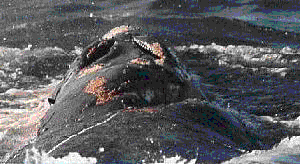WhaleNet will make available information from as many as 12 satellites each year. Found in the satellite data are fixes of a Northern Right Whale named "Metompkin" that became entangled in fishing equipment off the coast of Georgia, two blue whales feeding in the Gulf of St. Lawrence, and a hooded seal, "Stephanie", on her migration to polar waters. The tagging data is made available on WhaleNet through a collaborative program with research groups, WhaleNet and the Pelagic Research Lab at the New England Aquarium.
As WhaleNet progesses we will have satellite tags on right whales, blue whales, humpback whales, fin whales, seals, and possibly bowhead whales. We plan to begin this spring with tags on arctic seals that will be released from the New England Aquarium. We hope that you will participate and check back on a regular basis.



